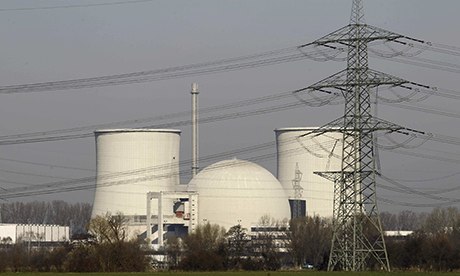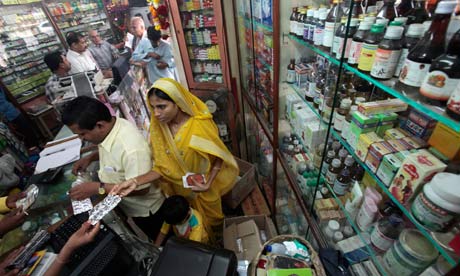By
Bari Bates in Asia Times Online
BRUSSELS - Behind closed doors,
a trade deal affecting a fifth of the world's
population has been quietly in the works for
years. But while details of the free trade
agreement (FTA) between the European Union and
India remain ambiguous to the general public,
concerns continue to mount over the effects such a
deal could have on an unsuspecting third party:
the affordable drug market of the developing
world.
Negotiations have been underway for
five years, with details on issues such as India's
generic drug market sending delegates from both
the EU and India through multiple rounds of
deliberations in the hopes of settling on an FTA
that would be "mutually beneficial and
sustainable", especially given Europe's current
economic climate.
Finally, the five-year
ordeal seems to be moving toward a conclusion,
according to the European External Action service.
The latest EU-India summit took place on February
10 and was hailed by Jose Manuel
Durao Barroso, president of the European
Commission, as a "significant step forward".
The European Union is already India's
primary trade partner and largest source of
foreign direct investment (FDI), according to
Barroso.
EU-India trade doubled to more
than 67.9 billion euros (US$89.5 billion) in 2010
from 28.6 billion euros in 2003, while EU
investment has tripled to three billion euros
since 2003.
Barroso says the final
agreement will be reached this autumn and, if
passed, would signal the implementation of the
world's largest trade agreement in the world,
opening the doors for research and innovation, job
creation, and countless business opportunities.
But some experts and activists are
fiercely opposed to the deal, which they say will
stunt the availability of affordable medicine in
the developing world.
'Hands off our
medicine'These concerns aren't new; the
issue has been on the radars of several
organizations for years, with growing concerns
over how the trade agreement is being reached and
what it means for organizations who work to supply
low-cost medicines to those in need.
As
the FTA has evolved, certain measures such as data
exclusivity have been taken off the table, though
other potentially harmful provisions remain.
Initial opposition to the trade deal
centered on issues of intellectual property rights
and market access for large European businesses,
with the not-for-profit group Corporate Europe
Observatory (CEO) at the helm with a petition to
halt the trade agreement altogether. The petition
had the signatures of over 100 organizations as of
December 2010, just prior to the 11th EU-India
summit.
One of CEO's biggest concerns is
that new trade rules could stall the distribution
of generic drugs, thus keeping patented medicine
prices high and increasing the overall cost of
healthcare for households. According to Oxfam
International, generic competition lowers medicine
prices by 90-99%.
Most significantly,
generic competition in India has lowered prices
for first line antiretroviral drugs to US$100 per
year for a single patient, down from $10,000 just
10 years ago for the same treatment.
Doctors Without Borders (known in French
as Medecins Sans Frontieres, or MSF), an
independent international medical humanitarian
organization that delivers emergency aid, has also
been steering opposition to the FTA's impact on
generic drugs.
The organizations's
campaign called for Europe to keep its "hands off
our medicine" and issued a statement outlining
risks associated with the widening net of
enforcement provisions, which have serious
implications for the availability of medicines.
If certain enforcement provisions related
to intellectual property are included in the FTA,
they could give large pharmaceutical companies the
right to sue not only generic drug manufacturers
but also generic drug suppliers and customers, MSF
said.
Such measures could deter treatment
providers from buying or supplying generic drugs,
leaving the far more expensive brand drugs as the
only option for people in desperate need.
The organization rallied in New Delhi on
February 10 along with HIV-positive community
members to call attention to the remaining
provisions in the FTA that put the generic drug
market in serious jeopardy.
Nearly 2,000
people strong, the protests included remarks from
MSF president Unni Karunakara, who said, "We have
watched too many people die in places where we
work because the medicines they need are too
expensive. We cannot allow this trade deal to shut
down the pharmacy of the developing world."
Given that Europe posits itself as a world
leader in development aid, the potential hypocrisy
of the situation isn't lost: if these provisions
are, in fact, included in the FTA, the EU stands
to undermine its own large-scale aid efforts by
limiting access to life-saving medications.
Besides the petition, CEO also launched
legal action against the European Commission early
last year, claiming that corporate lobby groups
were given privileged access to information on the
EU-India trade talks.
The organization
alleged that 17 documents were released to
industrial players but withheld from CEO because
it would "undermine the EU's international
relations".
CEO requested the documents in
order to monitor the trade deal, which the
organization believes leans much heavily towards
the interests of large corporations at the expense
of trade unions, non-governmental organizations
and small enterprises.
CEO's Pia Eberhardt
said that she expects a hearing within the first
half of this year, though no formal date has been
set. From that point, it will take roughly six
additional months to reach a conclusion. But while
the case circles the justice system, the FTA could
slip through the cracks.


